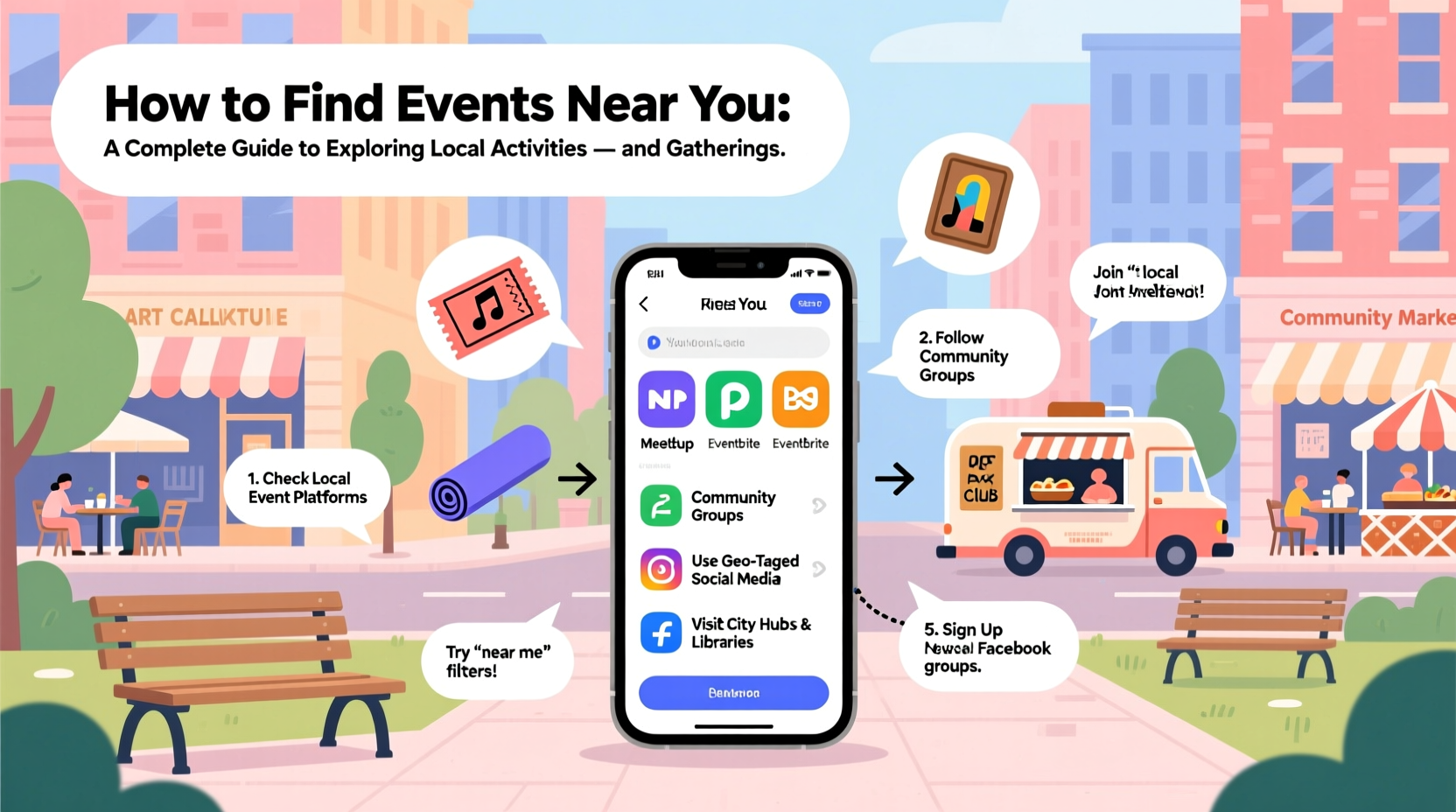Staying connected to your community doesn’t have to mean waiting for word-of-mouth invitations or stumbling upon flyers by chance. Whether you're new to a city, looking to expand your social circle, or simply want to break the routine, discovering local events can enrich your life in unexpected ways. From farmers markets and art exhibitions to tech meetups and outdoor yoga classes, vibrant activities are happening every day just around the corner — if you know where to look.
Finding these opportunities isn’t about luck; it’s about strategy. With the right tools and habits, anyone can become an expert at uncovering what’s happening nearby. This guide walks through proven methods, digital platforms, offline networks, and smart planning techniques that help you stay informed, engaged, and excited about what your area has to offer.
Leverage Local Event Platforms and Apps

The most direct way to discover nearby happenings is through dedicated event platforms. These services aggregate listings from venues, organizers, and community boards, making them searchable by date, category, and proximity.
Popular platforms include:
- Eventbrite – Ideal for ticketed events like workshops, lectures, and performances.
- Meetup – Best for recurring group activities based on shared interests (e.g., hiking, coding, language exchange).
- Facebook Events – Offers both public and private event discovery with strong local filtering.
- Google Events – Integrated into Google Search and Maps; shows real-time results when you search “events near me.”
- Nextdoor – Neighborhood-focused, great for hyper-local gatherings like garage sales or block parties.
When using these tools, refine your searches with keywords relevant to your interests—such as “live jazz,” “vegan food festival,” or “beginner pottery class”—and filter by distance and date range to avoid information overload.
Explore Community Hubs and Offline Networks
Digital tools are powerful, but some of the best events aren't widely advertised online. Physical spaces often serve as informal centers for local engagement.
Visit or follow:
- Public libraries – Host author talks, film screenings, job workshops, and children’s programs.
- Coffee shops and cafes – Bulletin boards frequently feature flyers for open mics, dance classes, and volunteer drives.
- Community centers and rec facilities – Offer seasonal calendars with sports leagues, fitness challenges, and cultural celebrations.
- Local universities and colleges – Many campus events, including guest lectures and art shows, are open to the public.
- Places of worship – Often organize interfaith dinners, charity runs, and music nights open to all.
“Some of the most meaningful connections I’ve made started at a small poetry reading in a bookstore no algorithm would have suggested.” — Maya Tran, Urban Sociologist
Don’t underestimate the value of asking staff or regulars at these locations. A simple “What’s going on around here this weekend?” can lead to insider recommendations.
Step-by-Step Guide to Building Your Local Event Routine
To consistently engage with your community, create a personal system for staying updated. Follow this five-step process:
- Identify your interests – List 3–5 activity types you enjoy (e.g., live music, outdoor adventures, learning new skills).
- Pick 2–3 primary discovery tools – Choose platforms that align with your preferences (e.g., Meetup for social groups, Eventbrite for curated experiences).
- Subscribe and set reminders – Sign up for newsletters and enable location-based alerts on your phone.
- Block time monthly – Dedicate one evening per month to review upcoming events and mark your calendar.
- Attend with intention – Go not just to check a box, but to connect. Bring a friend or go solo with the goal of meeting one new person.
Maximize Discovery: Do’s and Don’ts
Avoid common pitfalls that limit your access to great local experiences. Use this table to guide your approach:
| Do’s | Don’ts |
|---|---|
| Follow local event pages on social media (e.g., @CityArtsCouncil) | Assume all events require tickets or formal RSVPs |
| Check municipal websites for festivals, parades, and public meetings | Limit yourself to events within a 5-mile radius—sometimes nearby towns offer unique options |
| Join niche Facebook Groups (e.g., “Urban Gardeners of Austin”) | Wait until Friday to plan weekend activities—popular events fill quickly |
| Ask coworkers or neighbors what they’re attending | Dismiss events because they seem “not for people like me”—many are more inclusive than they appear |
Real Example: How Sarah Discovered Her City’s Hidden Culture Scene
Sarah moved to Denver for a remote job and initially felt isolated despite living in a vibrant metro area. She tried searching “fun things to do” but found generic tourist lists unhelpful. Instead, she took action: she joined a free Meetup group for urban sketching, visited her neighborhood library’s events board, and followed @DenverIndieEvents on Instagram.
Within weeks, she attended a pop-up mural painting session in RiNo, volunteered at a local zine fair, and even co-hosted a backyard storytelling night. These weren’t headline-grabbing spectacles—but they introduced her to creative locals who shared her curiosity. Six months later, Sarah says, “I don’t just know where to go—I feel like I belong.”
Expert Insight: The Value of Micro-Engagement
Dr. Alan Reyes, a sociologist studying urban connection, emphasizes that small-scale participation matters more than we think.
“Attending a low-pressure local event—even for 30 minutes—builds familiarity with places and people. That sense of recognition is the foundation of community belonging.” — Dr. Alan Reyes, Urban Engagement Researcher
He notes that repeated micro-engagements—like stopping by a weekly farmers market or joining a casual running club—create organic relationships over time, unlike one-off large concerts or conferences where anonymity prevails.
FAQ
How do I find free events near me?
Search terms like “free events [your city]” on Google, use filters on Eventbrite (select “Free” under price), and check community center bulletin boards. Libraries and parks departments often host no-cost programs open to all residents.
Are online event listings reliable?
Most major platforms verify organizers, but always double-check details before attending. Look for recent updates, official venue links, and user reviews. If an event seems suspicious or lacks contact info, it’s safer to skip.
What if there are no events matching my interests?
Consider starting your own. Use Meetup or Facebook to launch a book club, skill-share circle, or walking group. You’ll likely attract others who were also hoping for something similar. As one organizer put it, “The best way to find your people is to gather them.”
Conclusion: Turn Curiosity Into Connection
Finding events near you isn’t just about filling your calendar—it’s about deepening your relationship with the place you live. Every concert, workshop, or neighborhood cleanup is an invitation to participate, learn, and connect. By combining digital tools with real-world awareness and intentional habits, you transform passive residence into active belonging.









 浙公网安备
33010002000092号
浙公网安备
33010002000092号 浙B2-20120091-4
浙B2-20120091-4
Comments
No comments yet. Why don't you start the discussion?